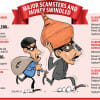Don’t allow criminals to milk the banking sector

It's unfortunate that at a time when we are expected to err on the side of caution and restraint – rather than of excess – in financial matters, given the country's economic crisis, the opposite is happening everywhere. A combination of factors including bad decisions, poor regulation and absent accountability for the wrong-doers continue to plague the sector. The High Court on Tuesday made a succinct observation that should be taken seriously: that the "most serious crimes" are being committed in the banking sector. How can our economy get out of the current mess if we don't stop this procession of scams and frauds?
The court's observation comes on the heels of the exposure of another scam in which a firm named SB Exim, using forged documents in the name of exporting terracotta tiles, allegedly swindled Tk 200 crore from Bangladesh Commerce Bank Ltd (BCBL) in 2018. That wasn't the end of it, however. BCBL, in response, was forced to create a loan against the payments made to the borrower as it hadn't received the money from foreign banks. Subsequently, the loan defaulted, leading to BCBL rescheduling it without informing Bangladesh Bank. Then, in a shocking move, the central bank permitted rescheduling the defaulted loan in violation of its own rules. It's like a crime cycle that begins and ends with bad decisions, with the public – the main sources of funds for lenders – caught in the middle.
Such scams are taking place quite regularly, thanks to lack of good governance and legal action for the criminals and their enablers. Our memories of scams involving BASIC Bank, Hallmark Group, Farmers Bank, Reliance Finance Ltd, International Leasing and Financial Services, People's Leasing and Financial Services and other institutions are still fresh. Many billions of taka were looted in the process. But hardly anything happened to the nexus of politicians, bankers and business magnets who took, and continue to take, advantage of our fragile regulatory structure.
The government's role in all this is quite disquieting: Not only has it not taken exemplary action against these "financial thugs", to quote an earlier HC observation, the central bank has even appeared to harbour defaulted borrowers, relaxing rules on loan classifications and rescheduling and thereby helping the industry to camouflage scams. Reportedly, bad loans totalled Tk 113,441 crore in March this year, just shy of the record high of Tk 116,288 crore totalled in September 2019.
A vested quarter is clearly at work trying to cripple our economy, laundering money through under-invoicing and over-invoicing in the name of exports/imports. Had the laundering been tackled, our foreign exchange reserves would have been in a better shape today. Besides the financial regulators, the Anti-Corruption Commission and the cumbersome judicial process are also responsible for the continuation of this situation and the culture of impunity thus created. We urge the government and the judiciary to take strong measures to stop financial irregularities.


 For all latest news, follow The Daily Star's Google News channel.
For all latest news, follow The Daily Star's Google News channel. 








Comments